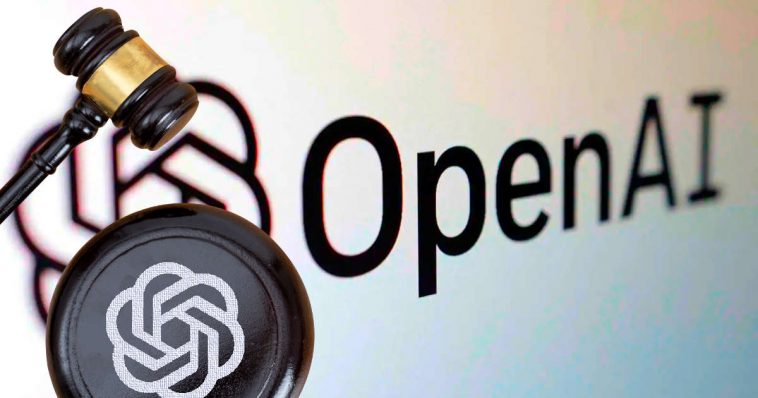OpenAI Facing FTC Investigation: Understanding The Potential Consequences

Table of Contents
The FTC's Concerns and Areas of Investigation
The FTC, tasked with protecting consumers, is increasingly focusing on the implications of AI. This OpenAI FTC investigation likely stems from concerns about the potential misuse of powerful AI technologies and their impact on consumer rights.
Data Privacy and Security
The FTC's investigation likely centers on how OpenAI collects, uses, and protects user data. Concerns include:
- Data breaches: The potential for vulnerabilities in OpenAI's systems leading to unauthorized access of sensitive user information.
- Data retention policies: The length of time OpenAI retains user data and the security measures implemented to protect it.
- Compliance with data privacy laws: Potential violations of regulations such as the General Data Protection Regulation (GDPR) in Europe and the California Consumer Privacy Act (CCPA) in the US.
- Transparency of data practices: Whether OpenAI is sufficiently transparent with users about its data collection and usage practices.
These concerns raise questions about user trust and the reputational risks for OpenAI if found to be non-compliant. A breach of user trust could lead to significant financial and legal repercussions.
Algorithmic Bias and Discrimination
The FTC is also likely concerned about potential biases embedded within OpenAI's algorithms. AI systems trained on biased data can perpetuate and amplify existing societal inequalities. For example:
- Gender bias: AI models may exhibit biases favoring one gender over another in various applications.
- Racial bias: Similar biases can manifest in relation to race and ethnicity.
- Economic bias: AI systems might disproportionately benefit certain socioeconomic groups.
These biases can lead to unfair or discriminatory outcomes, raising serious ethical and legal concerns. The OpenAI FTC investigation will likely examine whether OpenAI has taken sufficient steps to mitigate these biases and ensure fairness and equity in its AI systems.
Misinformation and Harmful Content Generation
The ability of OpenAI's technology to generate realistic text and other content raises concerns about the potential for misuse in creating and spreading misinformation:
- Deepfakes: The creation of convincing but false videos and audio recordings.
- Propaganda and disinformation campaigns: The use of AI to generate persuasive but misleading content.
- Harmful online content: The generation of hate speech, abusive language, or other harmful material.
Regulating AI-generated content presents a significant challenge, and the FTC's investigation will likely focus on OpenAI's efforts to prevent its technology from being used for malicious purposes.
Potential Consequences of the FTC Investigation
The OpenAI FTC investigation could have several significant consequences for the company:
Financial Penalties
OpenAI could face substantial fines for violations of consumer protection laws or other relevant regulations. These penalties could significantly impact the company's funding and ability to pursue future projects. The amount of the fine would depend on the severity of the violations found.
Regulatory Restrictions
The investigation might lead to stricter regulations on AI development and deployment. This could include increased oversight, more stringent compliance requirements, and potentially even limitations on certain AI applications. The resulting regulatory environment would directly impact OpenAI's operations and future innovation.
Reputational Damage
Negative publicity surrounding the investigation could damage OpenAI's brand image and public perception. Loss of user trust and investor confidence could have long-term consequences for the company's growth and sustainability. The impact on public trust in AI technology as a whole is another significant consideration.
The Broader Implications for the AI Industry
The OpenAI FTC investigation sets a crucial precedent for other AI companies. It highlights the growing need for robust AI regulations and underscores the ethical considerations surrounding AI development and deployment. The outcome will likely influence how other companies approach responsible AI practices. This increased scrutiny could, however, potentially stifle innovation if regulations become overly restrictive.
Conclusion
The OpenAI FTC investigation is a landmark event with profound implications for the future of AI. Potential consequences – financial penalties, stricter regulations, and reputational damage – highlight the urgent need for responsible AI development and deployment. The investigation's outcome will shape the AI regulatory landscape, influencing how companies approach this transformative technology. Stay informed about the OpenAI FTC investigation to understand its evolving impact on the AI industry and the future of this powerful technology.

Featured Posts
-
 Henry Cavill In Talks For Marvels Nova Series Fact Or Fiction
May 11, 2025
Henry Cavill In Talks For Marvels Nova Series Fact Or Fiction
May 11, 2025 -
 Indy 500 2025 New Rules Increase Driver Risk
May 11, 2025
Indy 500 2025 New Rules Increase Driver Risk
May 11, 2025 -
 Parliamentary Majority Defeats No Confidence Vote On Asylum Minister
May 11, 2025
Parliamentary Majority Defeats No Confidence Vote On Asylum Minister
May 11, 2025 -
 New York Knicks Defeat Chicago Bulls In Double Overtime
May 11, 2025
New York Knicks Defeat Chicago Bulls In Double Overtime
May 11, 2025 -
 Is Henry Cavill The Next Nova Examining The Casting Speculation
May 11, 2025
Is Henry Cavill The Next Nova Examining The Casting Speculation
May 11, 2025
